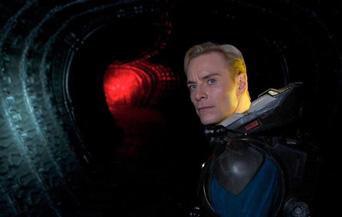Review: Prometheus
Nobody Does Sci-Fi Like Sir Ridley
By Tom Houseman
June 11, 2012
BoxOfficeProphets.com

In terms of its scope and style, Prometheus is completely different from Alien, the only other film in the franchise directed by Ridley Scott. The opening shots of grand, bright sweeping landscapes seem to belong to a different universe than the cold, dark, claustrophobic aura that permeates every moment of Alien. The two films do, however, share some tonal similarities, as Prometheus is just as effective as its predecessor at building suspense at a crawling pace and then letting loose with the terror for some truly frightening moments. But while Alien was more focused on its horror elements, both films are intensely visceral experiences that draw you in completely, and Prometheus is equally effective at inspiring awe as it is fear.
Prometheus is the long-awaited prequel to Scott's '80s sci-fi horror classic, but it is less interested in answering old questions than it is in raising new ones. The plot of the film is fairly straightforward, as we see a group of scientists exploring a seemingly abandoned planet in hopes of discovering the origins of humanity. There are big ideas in the film to match the stupendous scenery, and we are given just enough information about every character to understand their motivation for diving into the unknown.
But while the plot is driven by the characters, the true magic of the film rests in its visuals. Prometheus might not be the most groundbreaking visual sci-fi film, as you can see stylistic bits and pieces reminiscent of 2001: A Space Odyssey, Minority Report, Sunshine, and countless other movies. But it is the way that Scott uses the image to draw you into the film, building the suspense piece by piece, and then making the world explode around you, that makes the film's horror elements so effective. Scott can occasionally let his more epic films get away from him, losing control of ponderous action sequences, but here he is at his best, in meticulously moving the image in the same way he did with Alien and Blade Runner, only on a much grander scale.
Yes, Prometheus is a very philosophical, occasionally abstruse film that is not easily penetrated, which is why the characters, while not especially interesting, are crucial to making the film more accessible. The humanity of the characters is what keeps the plot moving and gives the extraordinary visuals a purpose. The dialogue comes off as very natural and unassuming, and the film's worst moments are when the characters attempt grandiosity or poeticism. Elizabeth Shaw is the moral center of the film, desperate for the knowledge to help her understand humanity's largest, vaguest questions. Noomi Rapace grounds the film very effectively, and we are able to use her as an emotional cipher: her fear and her anger feed our own.
Charlize Theron and Michael Fassbender are perfect foils for Rapace, playing off her character's determination and humanity in totally disparate ways. Fassbender's performance as the robot David is a perfect blend of man and automaton, always just a hair off but never enough to come off as gimmicky. Theron's Meredith Vickers is as driven as Rapace's Shaw, and when they play off each other sparks fly. Fortunately, Theron is just as cruel and selfish as she was as the queen in Snow White and the Huntsman, but is fortunately able to lower her decibel level considerably and gives a much more natural and effective performance.
If you are expecting every question about the Alien films to be answered in Prometheus, you are only setting yourself up for disappointment. This is a film about rumination, in which the destination is not just less important than the journey, but irrelevant, and possibly non-existent. Prometheus is entirely about the journey, what we learn about ourselves and those we love along the way, and why we keep going after what we want against all odds. If you are willing to let yourself get absorbed in the labyrinthian story and the emotional struggles of the characters, you will not be able to resist the overwhelming power of what is not only Ridley Scott's most ambitious science-fiction film, but perhaps his best.